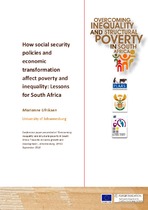| dc.contributor.author | Ulriksen, Marianne | |
| dc.date.accessioned | 2019-04-12T10:22:18Z | |
| dc.date.available | 2019-04-12T10:22:18Z | |
| dc.date.issued | 2010 | |
| dc.identifier.citation | Ulriksen, M., 2010. How social security policies and economic transformation affect poverty and inequality: Lessons for South Africa. Cape Town: Institute for Poverty Land and Agrarian Studies (PLAAS). | en_US |
| dc.identifier.uri | http://hdl.handle.net/10566/4610 | |
| dc.description.abstract | This article examines how various characteristics of social and economic policy frameworks affect poverty and inequality levels in developing countries, principally in Botswana and Mauritius. The research findings suggest that poverty and inequality are lower in countries with generous and broad-based – rather than pro-poor – social security policies, and where social policies are complemented by economic policies promoting economic transformation more so than merely economic growth. While South Africa’s challenges of combating poverty and inequality are shaped by its own historical context, the lessons from other countries offer the opportunity to reflect on the social consequences of various social and economic policy mixtures. Particularly, it may be worth considering how to bridge the divide between the economically productive contributors to social security policies and the economically marginalised beneficiaries of such policies. | en_US |
| dc.language.iso | en | en_US |
| dc.publisher | Institute for Poverty Land and Agrarian Studies (PLAAS) | en_US |
| dc.subject | Social protection | en_US |
| dc.subject | Economic transformation | en_US |
| dc.subject | Poverty reduction | en_US |
| dc.subject | Inequality | en_US |
| dc.title | How social security policies and economic transformation affect poverty and inequality: Lessons for South Africa | en_US |
| dc.type | Other | en_US |

